Internet Happenings, Events and Sources
| Marcus P. Zillman, M.S., A.M.H.A. Author/Speaker/Consultant Internet Happenings, Events and Sources |
|
Saturday, April 30, 2005 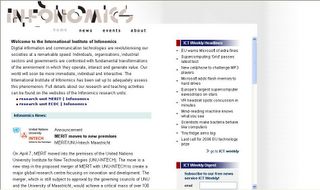 International Institute of Infonomics International Institute of Infonomics http://www.infonomics.nl/ Digital information and communication technologies are revolutionising our societies at a remarkable speed. Individuals, organisations, industrial sectors and governments are confronted with fundamental transformations of the environment in which they operate, interact and generate value. Our world will soon be more immediate, individual and interactive. The International Institute of Infonomics has been set up to adequately assess this phenomenon. Full details about their research and teaching activities can be found on the websites of the Infonomics research units: 1) research unit MERIT Infonomics, 2) research unit ECDC Infonomics. This has been added to Research Resources Subject Tracer™ Information Blog. This has been added to Directory Resources Subject Tracer™ Information Blog. posted by Marcus Zillman | 4:25 AM opensourceCMS - Try Before You Install http://www.opensourcecms.com/ This site was created with one goal in mind. To give you the opportunity to "try out" some of the best php/mysql based free and open source software systems in the world. You are welcome to be the administrator of any site here, allowing you to decide which system best suits your needs. The administrator username and password is given for every system and each system is deleted and re-installed every two hours. This allows you to to add and delete content, change the way things look, basically be the admin of any system here without fear of breaking anything. At the upper left hand side of your screen you will see a clock that is counting down. What it shows is how much time is left in this two hour demo window. Once the clock hits 00:00:00, opensourceCMS.com will shut down and the demos will be completely refreshed. This takes about 5 minutes, and afterwards opensourceCMS.com will re-activate and the demo's will appear as fresh installations ready to be demo'ed again.. This has been added to World Wide Web Reference Subject Tracer™ Information Blog. posted by Marcus Zillman | 4:20 AM CiteSeer - Scientific Literature Digital Library and Search Engine http://citeseer.ist.psu.edu/ CiteSeer is a scientific literature digital library and search engine that focuses primarily on the literature in computer and information science. CiteSeer aims to improve the dissemination and feedback of the scientific literature and to provide improvements in functionality, usability, availability, cost, comprehensiveness, efficiency, and timeliness in the access of scientific and scholarly knowledge. CiteSeer was developed at the NEC Research Institute by Steve Lawrence, Lee Giles and Kurt Bollacker. It is currently hosted at Penn State's School of Information Sciences and Technology under the direction of Professor Lee Giles. Isaac Councill is the CiteSeer adminstrator. The CiteSeer model is portable with a very similar search engine, SmealSearch, created for academic business documents. Rather than creating just another digital library, CiteSeer attempts to provide algorithms, metadata, services, techniques, and software that can be used in other digital libraries. CiteSeer indexes PostScript and PDF research articles on the Web. This will be added to Academic and Scholar Search Engines and Sources Annotated White paper Link Compilation. This will be added to Academic Resources 2005 Internet MiniGuide. This has been added to Research Resources Subject Tracer™ Information Blog. posted by Marcus Zillman | 4:15 AM  Google - My Search History https://www.google.com/searchhistory/ Ever find what you're looking for with Google, then promptly forget what you found? If so, you'll enjoy My Search History, a new service on Google Labs which lets you view and manage your search history from any computer via "My Search History" links in the upper-right corner of your Google home page and search results pages. My Search History shows you all the searches you've done on Google and the search results you've clicked on, and presents this information in ways we think are most useful. If you don't remember an exact search query, for instance, but you do remember when you did the search, you can use My Search History's calendar feature to check the searches you did on a given day and navigate to any of them with a single click. Full-text search over your history means you can easily find any search query or results page. They also show you related history over time; you can review everything Google has ever shown you about "apples", "bass fishing" or "the wizard of oz," for instance, by clicking the "Related history" link next to any search term when it appears. My Search History also gives you useful info while you're searching on Google. Next to your search results, you'll see how many times you've visited a certain search result and the last time you viewed it. And if we think it will help you find what you're looking for, they will grab pages you've already clicked on and put them above your regular web results. posted by Marcus Zillman | 4:10 AM CITIDEL http://www.citidel.org/ CITIDEL is for you regardless of your age or occupation and if you are into computing, CITIDEL has something for you. Students can find definitions, demonstrations, pictures and applets, and materials for review and to get ahead. Teachers and professors will find plenty of materials to support their courses, plus tools to compose them into lists or lesson plans for students to access directly, or even to use right in the classroom! Researchers will enjoy a huge catalog and bibliography of the latest research and historical archives, culled from big names such as ACM Digital Library, DBLP, and CiteSeer. Professionals will find e-courses and tutorials, as well as articles and research publications to stay up-to-speed in the computing field. This has been added to Research Resources Subject Tracer™ Information Blog. This has been added to Student Research Resources Subject Tracer™ Information Blog. This will be added to Academic Resources 2005 Internet MiniGuide. posted by Marcus Zillman | 4:05 AM eBizSearch http://gunther.smeal.psu.edu/ eBizSearch is an experimental niche search engine that searches the web and catalogs academic articles as well as commercially produced articles and reports that address various business and technology aspects of e-Business. The search engine crawls websites of universities, commercial organizations, research institutes and government departments to retrieve academic articles, working papers, white papers, consulting reports, magazine articles, and published statistics and facts. For certain documents, the database only stores the hyperlinks to those documents. eBizSearch performs a citation analysis of all the academic articles accessed and lists them in order of their citation rates in academic papers (the most cited articles are listed first). Articles available through the eBizSearch engine can be downloaded (for fair use) without any charges. However, some articles may have only the abstracts listed, and may have to be purchased directly from the appropriate sources. This will be added to Academic and Scholar Search Engines and Sources Annotated White paper Link Compilation. This will be added to Academic Resources 2005 Internet MiniGuide. This has been added to Business Intelligence Resources Subject Tracer™ Information Blog. posted by Marcus Zillman | 4:00 AM Friday, April 29, 2005 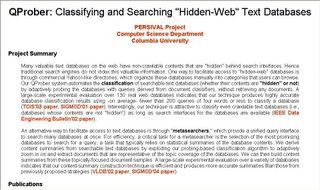 QProber QProber: Classifying and Searching "Hidden-Web" Text Databases http://qprober.cs.columbia.edu/ Project Summary Many valuable text databases on the web have non-crawlable contents that are "hidden" behind search interfaces. Hence traditional search engines do not index this valuable information. One way to facilitate access to "hidden-web" databases is through commercial Yahoo!-like directories, which organize these databases manually into categories that users can browse. Our QProber system automates the classification of searchable text databases (whether their contents are "hidden" or not) by adaptively probing the databases with queries derived from document classifiers, without retrieving any documents. A large-scale experimental evaluation over 130 real web databases indicates that our technique produces highly accurate database classification results using -on average- fewer than 200 queries of four words or less to classify a database (TOIS'03 paper; SIGMOD'01 paper). Interestingly, our technique is attractive to classify even crawlable text databases (i.e., databases whose contents are not "hidden") as long as search interfaces for the databases are available (IEEE Data Engineering Bulletin'02 paper). An alternative way to facilitate access to text databases is through "metasearchers," which provide a unified query interface to search many databases at once. For efficiency, a critical task for a metasearcher is the selection of the most promising databases to search for a query, a task that typically relies on statistical summaries of the database contents. We derive content summaries from searchable text databases by exploiting our probing-based classification algorithm to adaptively zoom in on and extract documents that are representative of the topic coverage of the databases. We can then build content summaries from these topically-focused document samples. A large-scale experimental evaluation over a variety of databases indicates that our content-summary construction technique is efficient and produces more accurate summaries than those from previously proposed strategies (VLDB'02 paper, SIGMOD'04 paper). Panagiotis G. Ipeirotis recommended the following papers from their comprehensive database: http://qprober.cs.columbia.edu/publications/icde2005-abstract.html http://qprober.cs.columbia.edu/publications/tois2003-abstract.html http://qprober.cs.columbia.edu/publications/vldb2002-abstract.html This has been aded to Deep Web Research Subject Tracer™ Information Blog. posted by Marcus Zillman | 4:25 AM ClassRoomDoor.com - Online Computer Courses – Computer Training http://www.classroomdoor.com/ Classroomdoor.com is your source for over 1,600 online courses to help you meet all of your computer training needs. Advance your career or get a better job - make more money - by acquiring new skills or improving current skills. Our online computer courses range from Microsoft Office Training Courses to learning how to start a small business, personal and professional growth. This has been added to Tutorial Resources Subject Tracer™ Information Blog. posted by Marcus Zillman | 4:20 AM CERN Workshop on Innovations in Scholarly Communication (OAI4) http://oai4.web.cern.ch/OAI4/ The CERN Workshop on Innovations in Scholarly Communication (OAI4)has been announced. This fourth workshop in the series, which began life as the Open Archives Initiative Workshop in 2001, is a forum for technical issues associated with scholarly communication. OAI4 will be held at CERN in Geneva, Switzerland from the 20th to the 22nd October 2005. posted by Marcus Zillman | 4:15 AM XMethods - Publicly Available Web Services http://www.xmethods.com/ Emerging web services standards such as SOAP, WSDL and UDDI will enable system-to-system integration that is easier than ever before. This site lists publicly available web services. Access XMethods through a variety of interfaces: 1) UDDI v2, 2) WS-Inspection, 3) RSS, 4) SOAP, and 5) DISCO. This has been added to Research Resources Subject Tracer™ Information Blog. This has been added to eCommerce Resources Subject Tracer™ Information Blog. This has been added to World Wide Web Reference Subject Tracer™ Information Blog. posted by Marcus Zillman | 4:10 AM  AutoStitch AutoStitch - A New Dimension In Automatic Image Stitching http://www.cs.ubc.ca/~mbrown/autostitch/autostitch.html AutoStitch is the world's first fully automatic 2D image stitcher. Capable of stitching full view panoramas without any user input whatsoever, AutoStitch is a breakthrough technology for panoramic photography, VR and visualisation applications. AutoStitch is built using cutting edge research from the AI lab at UBC, but it's incredibly simple to use! Just select a set of photos, and AutoStitch does the rest: digital photos in, panoramas out. Try the free demo (for Windows). For more examples of panoramas stitched using AutoStitch, please see our Panorama Gallery. AutoStitch is the product of two years of research by Matthew Brown and David Lowe at the University of British Columbia. For details and research papers please see our panorama research page. This has been added to Artificial Intelligence Resources Subject Tracer™ Information Blog. posted by Marcus Zillman | 4:05 AM Archives of Medical Research http://www.sciencedirect.com/science/journal/01884409 Official Publication of the Instituto Mexicano del Seguro Social (IMSS). Former title: Archives de Investigación Médica. Archives of Medical Research publishes original peer-reviewed medical research in an attempt to bridge the gaps created by medical specialization. Contributions are grouped into three main categories - biomedical, clinical, and epidemiological. Review articles, outstanding case reports, and preliminary communications will also be considered. As an international publication, the study of diseases is presented from various perspectives to provide the medical community with original investigation from molecular biology to clinical epidemiology within a single publication. Publisher: Elsevier This has been added to Healthcare Resources Subject Tracer Information Blog. This will be added to Healthcare Resources 2005 Internet MiniGuide. posted by Marcus Zillman | 4:00 AM Thursday, April 28, 2005 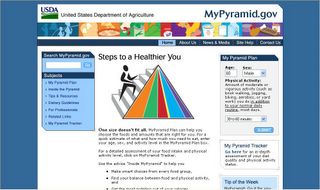 MyPyramid.gov - United States Department of Agriculture MyPyramid.gov - USDA http://foodpyramid.gov/ One size doesn't fit all. MyPyramid Plan can help you choose the foods and amounts that are right for you. For a quick estimate of what and how much you need to eat, enter your age, sex, and activity level in the MyPyramid Plan box. For a detailed assessment of your food intake and physical activity level, click on the MyPyramid Tracker. Use the advice "Inside MyPyramid" to help you: a) Make smart choices from every food group, b) Find your balance between food and physical activity, and c) Get the most nutrition out of your calories. This will be added to Healthcare Resources 2005 Internet MiniGuide. This has been added to Agriculture Resources Subject Tracer™ Information Blog. posted by Marcus Zillman | 4:25 AM ExRx (Exercise Prescription) on the Net http://www.exrx.net/ ExRx.net is a exercise resource of nearly 1500 pages for the exercise professional, coach, or fitness enthusiast. ExRx.net features a comprehensive exercise instruction and kinesiology reference for exercise prescription with over 500 animated exercises demonstrated, described, and analyzed. This will be added to Healthcare Resources Resources 2005 Internet MiniGuide. posted by Marcus Zillman | 4:20 AM Montage-a-google http://grant.robinson.name/projects/montage-a-google/ Montage-a-google is a simple web-based app that uses Google's image search to generate a large gridded montage of images based on keywords (search terms) entered by the user. Not only an interesting way of browsing the net, it can also be used to create desktop pictures or even posters (see examples below - more coming soon). Guess-the-google http://grant.robinson.name/projects/guess-the-google/ After creating Montage-a-google, several people wrote to Grant suggesting he make a game based on the same technology. Guess-the-google reverses this process by picking the keywords for you, the player must then guess what keyword made up the image - it's surprisingly addictive. posted by Marcus Zillman | 4:15 AM 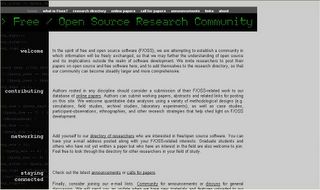 Free/Open Source Research Community Hybrid Innovation - How Does the Collaboration Between the FLOSS Community and Corporations Happen? by Yuwei Lin http://opensource.mit.edu/papers/lin4_hybrid.pdf Abstract Unlike innovation based on a strong professional culture involving close collaboration between professionals in academia and/or corporations, the current Free/Libre Open Source Software (FLOSS) development entails a global knowledge network, which consists of 1) a heterogeneous community of individuals and organisations who do not necessarily have professional backgrounds in computer science but competent skills to understand programming and working in a public domain; 2) corporations. This paper highlights the importance of the hybrid form of developing and implementing software, and also identifies several key factors shaping the collaboration between OSS firms and the community. posted by Marcus Zillman | 4:10 AM Scientific Impact Quantity and Quality: Analysis of Two Sources of Bibliographic Data by R.K.Belew http://arxiv.org/PS_cache/cs/pdf/0504/0504036.pdf Abstract: Attempts to understand the consequence of any individual scientist's activity within the long-term trajectory of science is one of the most difficult questions within the philosophy of science. Because scientific publications play such as central role in the modern enterprise of science, bibliometric techniques which measure the ``impact'' of an individual publication as a function of the number of citations it receives from subsequent authors have provided some of the most useful empirical data on this question. Until recently, Thompson/ISI has provided the only source of large-scale ``inverted'' bibliographic data of the sort required for impact analysis. In the end of 2004, Google introduced a new service, GoogleScholar, making much of this same data available. Here we analyze 203 publications, collectively cited by more than 4000 other publications. We show surprisingly good agreement between data citation counts provided by the two services. Data quality across the systems is analyzed, and potentially useful complementarities between are considered. The additional robustness offered by multiple sources of such data promises to increase the utility of these measurements as open citation protocols and open access increase their impact on electronic scientific publication practices. This has been added to Research Resources Subject Tracer™ Information Blog. posted by Marcus Zillman | 4:05 AM Internet Filtering in China in 2004-2005: A Country Study http://www.opennetinitiative.net/studies/china/ The OpenNet Initiative tested China's Internet filtering of web content, blog postings, and e-mail correspondences. Their testing found efforts to prevent access to a wide range of sensitive materials, from pornography to religious material to political dissent. Unlike the filtering systems in many other countries, China’s filtering regime appears to be carried out at various control points and also to be changing over time. China operates the most extensive, technologically sophisticated, and broad-reaching system of Internet filtering in the world. China’s intricate technical filtering regime is buttressed by an equally complex series of laws and regulations that control the access to and publication of material online. However, ONI found that most major American media sites, such as CNN, MSNBC, and ABC, are generally available in China (though the BBC remains blocked). Moreover, most sites we tested in their global list’s human rights and anonymizer categories are accessible as well. This has been added to International Trade Resources 2005 Internet MiniGuide. posted by Marcus Zillman | 4:00 AM Wednesday, April 27, 2005 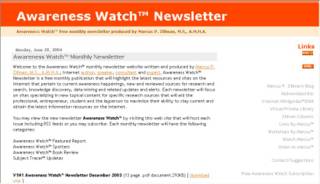 Awareness Watch™ Newsletter V3N5 May 2005 Awareness Watch™ Newsletter V3N5 May 2005 http://virtualprivatelibrary.blogspot.com/Awareness Watch V3N5.pdf Awareness Watch™ Newsletter Blog and Archives http://www.AwarenessWatch.com/ The May 2005 V3N5 Awareness Watch™ Newsletter is a freely available 32 page .pdf document (668KB) from the above URL. The Awareness Watch Featured Report this month highlights a comprehensive listing of online resources, sources and sites covering all areas of research resources for students. The Awareness Watch Spotters cover many excellent and newly released annotated current awareness research sources and tools as well as the latest identified Internet happenings and resources. The book review covers Eric von Hippel's Democratizing Innovation (MIT Press, 2005). posted by Marcus Zillman | 10:20 AM 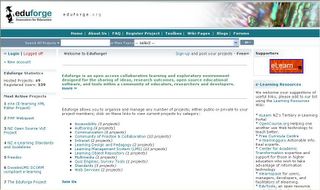 Eduforge Eduforge http://eduforge.org/ Eduforge is a virtual collaborative learning and exploratory environment designed for the sharing of ideas, research outcomes, open source educational software, and tools within a community of educators, researchers and developers. It is an open access resource allowing anyone with an interest in the exploration of teaching and learning to join the community. Eduforge encourages cross-institutional collaboration among individuals within an independent environment outside the normal boundaries of organisational infrastructure and resources. The Eduforge community is well supported by online communication, content and management tools, including Wiki tools, project management, forum, surveys, Concurrent Versions System (CVS), and document uploading and sharing. This has been added to Research Resources Subject Tracer™ Information Blog. posted by Marcus Zillman | 4:25 AM Browser Archive http://browsers.evolt.org/ One of the founding members of evolt.org, Adrian Roselli has provided this browser archive as well as its support through his company, Algonquin Studios. You can see more information at his archive announcement. This has been added to the tools section of Research Resources Subject Tracer™ Information Blog. posted by Marcus Zillman | 4:20 AM Summarization from Medical Documents: A Survey http://arxiv.org/ftp/cs/papers/0504/0504061.pdf The aim of this paper is to survey the recent work in medical documents summarization. During the last decade, documents summarization got increasing attention by the AI research community. More recently it also attracted the interest of the medical research community as well, due to the enormous growth of information that is available to the physicians and researchers in medicine, through the large and growing number of published journals, conference proceedings, medical sites and portals on the World Wide Web, electronic medical records, etc. This survey gives first a general background on documents summarization, presenting the factors that summarization depends upon, discussing evaluation issues and describing briefly the various types of summarization techniques. It then examines the characteristics of the medical domain through the different types of medical documents. Finally, it presents and discusses the summarization techniques used so far in the medical domain, referring to the corresponding systems and their characteristics. The paper discusses thoroughly the promising paths for future research in medical documents summarization. It mainly focuses on the issue of scaling to large collections of documents in various languages and from different media, on personalization issues, on portability to new sub-domains, and on the integration of summarization technology in practical applications. posted by Marcus Zillman | 4:15 AM Ocean Portal http://ioc.unesco.org/oceanportal/index.php Ocean Portal is a high-level directory of Ocean Data and Information related web sites. Its objective is to help scientists and other ocean experts in locating such data & information. The IOC/IODE Marine Data Training Team is grateful to the many (sometimes anonymous) compilers of ocean lists, whose work we have surveyed in the creation of this Portal. In the case of general 'marine science' lists, we have tried to add structure to the many useful links you have identified; in the case of specialized lists, we hope that the larger view provided here is appreciated, albeit with somewhat different categories. This has been added to Research Resources Subject Tracer™ Information Blog. posted by Marcus Zillman | 4:10 AM Hubble Public Talks http://hubblesite.org/about_us/public-talks.shtml Are you interested in planets, stars, galaxies, black holes? Listen to the latest and previous talks on what the Hubble Telescope is doing and its research into the Cosmos. The HubbleSite is also a very interesting place to receive all the latest news and happenings in relationship to the Hubble Telescope! This has been added to the Astronomy Resources Subject Tracer™ Information Blog. posted by Marcus Zillman | 4:05 AM How To Use CHADDB, A Free Database For Non-Profits and Churches http://searchenterpriselinux.techtarget.com/tip/0,289483,sid39_gci1073846,00.html When a new product is announced, the word goes out about its features. If the product sounds like a good thing, then you wonder, "What would it be like to use it?" SearchEnterpriseLinux.com's new product how-to series answers that question. Each how-to starts out with the basics -- product and vendor name, price, etc. -- and then gets down to business with a short how-to. This how-to was written by Don Parris, CHADDB developer and minister at Oakdale Christian Fellowship. posted by Marcus Zillman | 4:00 AM Tuesday, April 26, 2005 Business Intelligence Online Resources http://WhitePapers.VirtualPrivateLibrary.net/Business Intelligence Online Resources.pdf Internet Annotated Link Compilation white paper titled "Business Intelligence Online Resources" is a 66 page research paper listing selected resources both new and existing for online business intelligence. Each source is described along with the URL address than can be accessed. Also a comprehensive Business Intelligence link compilation is included! It is freely available as a .pdf file (1.70MB) at the above link from the Virtual Private Library™ and authored by Marcus P. Zillman, M.S., A.M.H.A. It was updated June 1, 2009. Other white papers are available by clicking here. Purchase 130 Page Professional Internet MiniGuide titled Market Intelligence Resources 2008 by clicking here. 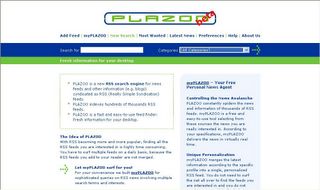 PLAZOO - RSS Search Engine PLAZOO - RSS Search Engine http://www.plazoo.com/ PLAZOO is a new RSS search engine for news feeds and other information (e.g. blogs) syndicated as RSS (Really Simple Syndication) feeds. PLAZOO indexes hundreds of thousands RSS feeds. PLAZOO is a fast and easy-to-use feed finder: Fresh information for your desktop. With RSS becoming more and more popular, finding all the RSS feeds you are interested in is highly time consuming. You have to surf multiple feeds on a daily basis, because the RSS feeds you add to your reader are not merged. They have built myPLAZOO for sophisticated queries on RSS news involving multiple search terms and interests. It filters the news you are interested in on the fly. Every query can be saved as RSS feed and also be easily added to your external RSS reader. Updates are performed on an hourly basis. This will be added to the search engine section of all the 2005 Internet MiniGuides. This has been added to the online resources of my Bots, Blogs and News Aggregators presentation site. posted by Marcus Zillman | 4:25 AM Thefacebook - Online College Social Networks Directory http://www.thefacebook.com/ Thefacebook is an online directory that connects people through social networks at colleges. For a complete list of supported schools, click here. Your facebook is limited to your own college or university. You can use Thefacebook to: a) Search for people at your school, b) Find out who is in your classes, c) Look up your friends' friends, and d) See a visualization of your social network. This has been added to Social Informatics Subject Tracer™ Information Blog. posted by Marcus Zillman | 4:20 AM Combining RDF and OWL with SOAP for Semantic Web http://www.ida.liu.se/~yuxzh/doc/ncws-041002.pdf Abstract by Authors: This paper has two contributions: (1) we attempt to propose that a combination of RDF and OWL with SOAP is useful for building semantic Web services (SWS); (2) we show how to combine them technically. A SOAP Envelope comprises Header (control data) and Body (transaction data). They are defined in XML schema syntactically not semantically, resulting in inflexibility for Web services invocation. RDF and OWL introduce ontology-based semantics into SOAP. We provide four-level SWS. This has been addded to the Semantic Web Research section of Deep Web Research Subject Tracer™ Information Blog. posted by Marcus Zillman | 4:15 AM Programmingtutorials.com - Free Online Programming Tutorials http://www.programmingtutorials.com/ You will find over 300 programming language tutorials, lessons, and how-to's. You can surf through their collection of free online tutorials or read postings in one of their forums. Just choose the language you are interested in learning, find a lesson and enjoy! This has been added to Tutorial Resources Subject Tracer™ Information Blog. posted by Marcus Zillman | 4:10 AM GLORIAD Global Ring Network for Advanced Applications Development http://www.gloriad.org/ GLORIAD provides scientists around the globe with advanced networking tools that improve communications and data exchange, enabling active, daily collaboration on common problems. With GLORIAD, the scientific community can move unprecedented volumes of valuable data effortlessly, stream video and communicate through quality audio- and video-conferencing. GLORIAD exists today due to the shared commitment of the US, Russia, China, Korea, Canada and the Netherlands to promote increased engagement and cooperation between their countries, beginning with their scientists, educators and young people. The benefits of this advanced network are shared with S&E communities throughout Europe, Asia and the Americas. GLORIAD provides more than a network; it provides a stable, persistent, non-threatening means of facilitating dialog and increased cooperation between nations that have often been at odds through the past century. This new era of cooperation will provide benefits not only to the S&E communities but to every citizen in the partner countries through: 1) Improved weather forecasting and atmospheric modeling through live sharing of monitoring data; 2) New discoveries into the basic nature and structure of the universe through advanced network connections between high energy physicists and astronomers - and the expensive facilities GLORIAD makes it possible to share; 3) Support of the global community building the International Thermonuclear Experimental Reactor (ITER), creating a technology which will someday provide a pactically limitless supply of energy; 4) Advancing joint geological sciences related to seismic monitoring and earthquake prediction; 5) Enabling new joint telemedical applications and practices; 6) Strengthening current programs in nuclear weapons disposal, nuclear materials protection, accounting and control and active discussions on combating terrorist threats; and 7) Increasing classroom to-to-classroom cooperation to accessible scientists and students in other countries through the 24/7 EduCultural Channel, the “Virtual Science Museum of China,” the Russia-developed “Simple Words ” global essay contest, and a special partnership with International Junior Achievement. These are a small sample of the literally hundreds of active collaborations served by both the general and advanced network services provided by GLORIAD. This has been added to Research Resources Subject Tracer™ Information Blog. This has been added to Student Research Resources Subject Tracer™ Information Blog. posted by Marcus Zillman | 4:05 AM W3C Track Featured at WWW2005 http://www.w3.org/2005/01/w3c-track05.html http://www2005.org/ http://www.w3.org/2005/04/www2005-pressrelease The W3C Track chaired by Marie-Claire Forgue runs from 11-13 May at the Fourteenth International World Wide Web Conference (WWW2005) in Chiba, Japan. W3C Members and Team present three days of content on W3C technologies and achievements. Conference attendees are also invited to Developers Day presentations on 14 May. posted by Marcus Zillman | 4:00 AM Monday, April 25, 2005 SLA Asian Chapter News http://VirtualPrivateLibrary.BlogSpot.com/SLA_Asia_Chapter_News_V2N1.pdf The SLA Asian Chapter News (the official newsletter of the Asian Chapter of the Special Libraries Association) V2N1 January - March 2005 had an article on Zillman's Resources Page 4 and 5 written by the Chapter's President Jane Macoustra. She reviewed a number of my freely available resources and I greatly appreciated her last paragraph of the article: " I have only just touched the surface of the riches you can locate on Marcus Zillman's web pages, so go and check out this site. You will be pleasantly surprised by the amount of free, reliable information that is available. One of the best things about finding sites like this is that you know that the information is authoritative, high quality information." posted by Marcus Zillman | 6:08 PM  May 2005 Zillman Column May 2005 Zillman Column - Sematic Web Research Resources http://VirtualPrivateLibrary.BlogSpot.com/Semantic Web May05 Column.pdf http://www.zillmancolumns.com/ The May 2005 Zillman Column is now available and is titled Semantic Web Research Resources. This May column is a comprehensive listing of semantic web research resources and sources on the World Wide Web. Many have stated that the semantic web is the future of the Internet and the way that the world wide web will be organized, searched and applied in the near future. These resources will allow you to discovery the latest knowledge about the semantic web as well as learn what is happening now that will affect the way that you utilize this phenomenal resource we call the Internet! Download this excellent 14 page free .pdf (339KB) column today and begin looking at the World Wide Web through a semantic eye! © 2005 Marcus P. Zillman, M.S., A.M.H.A. posted by Marcus Zillman | 4:30 AM 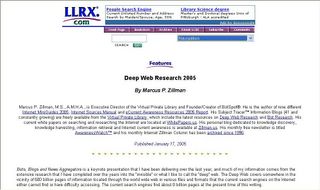 LLRX - Deep Web Research 2005 Feature Article This mp3 broadcast edition of Current Awareness Happenings on the Internet by Marcus P. Zillman, M.S., A.M.H.A. April 25, 2005 V3N17 discusses Deep Web Research. Click on the below audio mp3 broadcast to hear Marcus P. Zillman describing this article and resource that he authored and maintains. View these sites at: Deep Web Research http://www.llrx.com/features/deepweb2005.htm http://www.DeepWebResearch.info/  Canadian Geographic Atlas Online Canadian Atlas Online http://canadiangeographic.ca/atlas/intro.aspx?lang=En The Royal Canadian Geographical Society proudly presents a groundbreaking Internet achievement, The Canadian Atlas Online, which brings cartography to life with exciting graphics and animation. This state-of-the-art interactive atlas allows you to explore Canada in a way you’ve never experienced before, and helps the Society to fulfill their mission to make Canada better known. This has been added to Reference Resources Subject Tracer™ Information Blog. posted by Marcus Zillman | 4:25 AM Finding Images Online: Directory of Web Image Sites http://www.berinsteinresearch.com/fiolinks.htm This site was found on the Metro Desk Blog and titled Finding Images Online: Directory of Web Image Sites is a list, organized alphabetically by subject, of Web sources of pictures. The list does not indicate the criteria for inclusion, nor does it in any way imply that sources will allow free use of the images. However, this could be a useful guide for finding an elusive image. The list was compiled by Paula Berinstein, a librarian and writer. This will be added to the search engine section of all the 2005 Internet MiniGuides. posted by Marcus Zillman | 4:15 AM Social Bookmarking Tools (I) - A General Review by Tony Hammond, Timo Hannay, Ben Lund, and Joanna Scott http://www.dlib.org/dlib/april05/hammond/04hammond.html Because, to paraphrase a pop music lyric from a certain rock and roll band of yesterday, "the Web is old, the Web is new, the Web is all, the Web is you", it seems like we might have to face up to some of these stark realities [n1]. With the introduction of new social software applications such as blogs, wikis, newsfeeds, social networks, and bookmarking tools (the subject of this paper), the claim that Shelley Powers makes in a Burningbird blog entry [1] seems apposite: "This is the user's web now, which means it's my web and I can make the rules." Reinvention is revolution – it brings us always back to beginnings. This paper reviews some current initiatives, as of early 2005, in providing public link management applications on the Web – utilities that are often referred to under the general moniker of 'social bookmarking tools'. There are a couple of things going on here: 1) server-side software aimed specifically at managing links with, crucially, a strong, social networking flavour, and 2) an unabashedly open and unstructured approach to tagging, or user classification, of those links. A number of such utilities are presented here, together with an emergent new class of tools that caters more to the academic communities and that stores not only user-supplied tags, but also structured citation metadata terms wherever it is possible to glean this information from service providers. This provision of rich, structured metadata means that the user is provided with an accurate third-party identification of a document, which could be used to retrieve that document, but is also free to search on user-supplied terms so that documents of interest (or rather, references to documents) can be made discoverable and aggregated with other similar descriptions either recorded by the user or by other users. This has been added to Social Informatics Subject Tracer™ Information Blog. posted by Marcus Zillman | 4:10 AM VideoHelp.com http://www.videohelp.com/ This site will help you to make your own VideoCDs, SVCDs or DVDs that can be played on your standalone DVD Player from video sources like DVD, Video, TV, DV, Cam or downloaded movie clips like DivX, MOV, RM, WMV and ASF. We also have extensive lists of Capture Cards, DVD Media, computer DVD Writers, desktop DVD Recorders and desktop DVD Players with features, compatibility information and user comments. This has been added to Tutorial Resources Subject Tracer™ Information blog. posted by Marcus Zillman | 4:05 AM Meetro http://meetro.com/index.php Meetro is the new online meeting place that lets you find friends and new people, events, restaurants and all sorts of other stuff – based on wherever you are when you're using Meetro. At the coffeeshop, the airport lounge, your best friend's couch… Meetro goes where you go, hooking you up with whoever and whatever's local. You can chat with your buddies on all the standard online networks – AIM, Yahoo, ICQ – and meet new Meetro users in your vicinity. You can create your own profile, check out your friends' profiles and share photo galleries. And best of all, you can see who's online locally and what's going on in your neighborhood – whether you're out of town or right next door. This has been added to Social Informatics Subject Tracer™ Information Blog. posted by Marcus Zillman | 4:05 AM Sunday, April 24, 2005 3-D Simulations 1) Stanford University: Folding@home http://folding.stanford.edu/ 2) Center for Automation in Nanobiotech: Nanorobotics http://www.nanorobotdesign.com/ 3) University of Texas Austin: Robotics Research Group http://www.robotics.utexas.edu/simulations/ 4) EdCenter: Interactive 3D Modelling http://www.edcenter.sdsu.edu/geowall/ 5) EuclideanSpace: Building a 3D World http://www.euclideanspace.com/ 6) The Breve Simulation Environment http://www.spiderland.org/breve/ 7) Cyberbotics, Ltd.: Webots™ http://www.cyberbotics.com/publications/ars.pdf Three-dimensional (3-D) rendering and animation technology is not only used for entertainment, but also for research and educational purposes. The technology can be used for purposes of scientific simulation in fields such as physics, biology, or chemistry. For example, Stanford University's Folding@home project (1) uses 3-D simulations and distributed computing to study protein folding, misfolding, aggregation, and related diseases. Three-D simulations can also be used to observe phenomena that would normally be impossible to scrutinize in detail, as is demonstrated on this website on Nanorobotics (2). This next website describes work by the Robotics Research Group (3) in using 3-D simulations to enhance undergraduate and graduate engineering education. The EdCenter (4) makes available several compressed files of 3-D simulations that model earthquake data, Mars, a San Diego Fly Through, and more. On this website (5 ), Martin Baker provides "all you need to know about 3D theory" and this website (6) provides access to a free open-source software package which "makes it easy to build 3-D simulations of decentralized systems and artificial life." This last article from Cyberbotics, Ltd. (7) discusses how mobile robotics simulation programs can be used to design robots. [From The NSDL Scout Report for Math, Engineering, and Technology, Copyright Internet Scout Project 1994-2005. http://scout.wisc.edu/] posted by Marcus Zillman | 4:25 AM Genographic Project http://www3.nationalgeographic.com/genographic/ The National Geographic Society, IBM, geneticist Spencer Wells, and the Waitt Family Foundation have launched the Genographic Project, a five-year effort to understand the human journey—where we came from and how we got to where we live today. This unprecedented effort will map humanity's genetic journey through the ages. The fossil record fixes human origins in Africa, but little is known about the great journey that took Homo sapiens to the far reaches of the Earth. How did we, each of us, end up where we are? Why do we appear in such a wide array of different colors and features? Such questions are even more amazing in light of genetic evidence that we are all related—descended from a common African ancestor who lived only 60,000 years ago. Though eons have passed, the full story remains clearly written in our genes—if only we can read it. With your help, we can. When DNA is passed from one generation to the next, most of it is recombined by the processes that give each of us our individuality. But some parts of the DNA chain remain largely intact through the generations, altered only occasionally by mutations which become "genetic markers." These markers allow geneticists like Spencer Wells to trace our common evolutionary timeline back through the ages. "The greatest history book ever written," Wells says, "is the one hidden in our DNA." This has been added to Biological Informatics Subject Tracer&ttrade; Information Blog. posted by Marcus Zillman | 4:20 AM Gravatar http://www.gravatar.com/ A gravatar, or globally recognized avatar, is quite simply an 80×80 pixel avatar image that follows you from weblog to weblog appearing beside your name when you comment on gravatar enabled sites. Avatars help identify your posts on web forums, so why not on weblogs? Stay up to date with The Gravatar Weblog. posted by Marcus Zillman | 4:15 AM |
|
||||
|
|
|||||